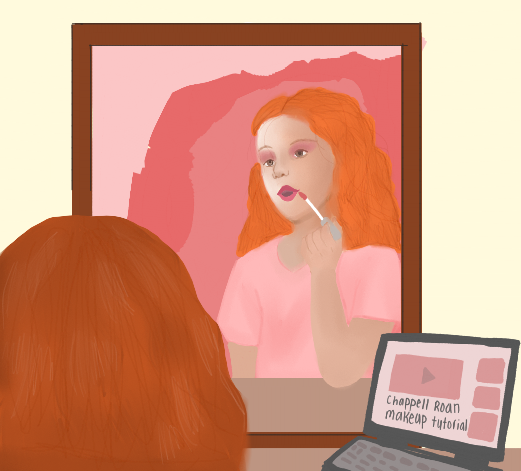
As pop artists such as Olivia Rodrigo, Chappell Roan and Tate McRae rise in popularity, many teenagers are embracing these influences as they express themselves in bold and authentic ways. The artists’ unapologetic individuality and relatable messages continue to inspire SCHS students and staff to break free from mainstream aesthetics and explore their own unique identities.
English teacher Erin Southard noticed a significant shift in how students express themselves compared to past years. In earlier times, students were more hesitant to step outside traditional norms, but today, influenced by modern pop stars, they are embracing individuality more openly.
“Compared to when I was in high school, people today are freer to express themselves. A big part of that is having icons to emulate and look up to, which I think is a healthy good thing,” Southard said.
Junior Zaria Randall-Reed shared a similar sentiment, noting that artists like Olivia Rodrigo help her express herself emotionally. She appreciates Rodrigo’s relatable lyrics, which capture the teenage experience.
“I think Olivia Rodrigo was a big deal because, with her first album, she wasn’t just talking about personal songs. She was a teenager writing personal songs, which is why she got popular,” Randall-Reed said. “She was a lot younger than many artists, so she wrote relatable things, not just about heartbreak, but about being a teenager.”
Sophomore Isabel Bernstein noted that the impact of some artists extends beyond personal expression as they challenged conventional standards of beauty and authenticity. Bernstein explained that she has noticed a visible shift in how their peers approach self-expression and comfortability in their identity
“It’s good to see these ‘perfect’ artists showing their flaws,” Bernstein said. “In the past, models were so heavily Photoshopped, but now artists and models are being more real and true to themselves.”
English teacher Courtney Hayes spoke about Roan’s influence, noting how her music is more than just simple entertainment but a shared experience for millennial women. Hayes referred to the song “Pink Pony Club” and how it has become the soundtrack for countless social media posts, connecting women through a common emotional thread.
“Instagram reels featuring Chappell Roan’s ‘Pink Pony Club’ have become a kind of anthem for millennial women. It’s almost a universal cis-hetero girl experience, where the song plays in the background of parody and appreciation reels, connecting people in a shared moment,” Hayes said.
Randall-Reed echoed Hayes, noting that Roan appeals to a variety of people from diverse backgrounds.
“A lot of different people like her from all over, and I think she has a reach to different people. I’ve seen videos of seven-year-olds liking her, also older men and older generations,” Randall-Reed said.
Bernstein prefers music with a message, applauding artists like Charli XCX, Sir Chloe and Penelope Scott for their emotional depth and distinct individuality, which differs from the more superficial themes found in much of modern pop.
“I love Charli XCX. I also like Sir Chloe and Penelope Scott. They have deep, personal music, not like a lot of mainstream pop today, which can be meaningless,” Bernstein said.
Randall-Reed emphasized the importance of diversity and individuality in the music scene.
“Roan’s music is different. It’s still pop, but no one is doing the same thing as her, and she’s making an impact because she’s outspoken and doesn’t hold back,” Randall-Reed said.

